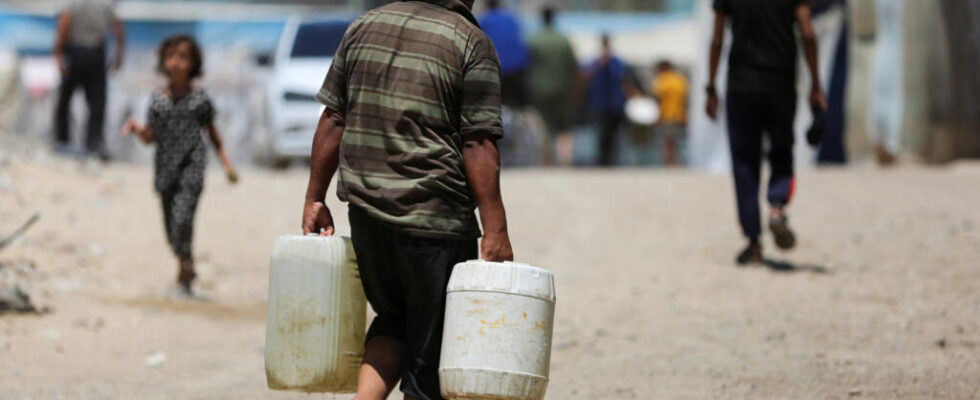In Gaza, ravaged by nearly ten months of war, the Israeli army bombed the main water reservoir of the city of Rafah last week. This is a total violation of international humanitarian law, since according to the Geneva Convention, the destruction of installations essential to the survival of civilians in times of war, such as drinking water installations, is prohibited.
1 min
With our correspondent in Jerusalem, Alice Froussard
The explosion of this water tank was filmed and then published on social networks by one of the Israeli soldiers, with a caption: ” This destruction of the Tel Sultan water reservoir is in honor of Shabbat. »
In addition to being an additional provocation by the Israeli army, the destruction of this water reserve in Rafah is a real tragedy for the many displaced people in Gaza. They already have very little access to these essential resources that are the waterfood, electricity and fuel.
Investigation opened after explosion of city’s main reservoir
The Rafah municipality condemned the bombing, and spoke of ” of a crime against humanity, which at the same time perpetuates a policy of collective punishment “Because since this main water reservoir was destroyed, there has been growing concern about access to water for the inhabitants who remain in this part of the enclave.
On Monday, July 29, the israeli army acknowledged that his soldiers were responsible for the bombing but – according to the Israeli daily Haaretz – the order to blow up the facility was allegedly given without the approval of senior officers. An investigation into the incident has been opened.
Despite the battle over the numbers of dead in Gaza, “the lists of names transmitted by the Hamas Health Ministry are largely reliable”
As the Israeli offensive on Gaza has lasted for almost ten months, the number of people, and particularly civilians killed, is the subject of a real battle of figures. Those of the Hamas Health Ministry, which currently reports more than 39,000 dead, have been questioned, notably by Joe Biden, the President of the United States.
A British NGO, Airwars, has been trying to identify nearly 3,000 victims who died in the first 17 days of the war in Gaza, which began on October 7. A time-consuming task carried out by the teams of Emily Tripp, director of Airwars: ” In our study we present where and how 3 000 people were killed in Gaza in the first three weeks of the war. We also explain how we managed to match almost all of these names with the list released by the Hamas Health Minister on October 26. »
The study carried out by the NGO allows two conclusions to be reached: ” First, that the lists of names provided by the Hamas Health Ministry are largely reliable. This is what we are able to demonstrate by comparing names with each other, without any other statistical estimation. But also that the voices raised in Gaza must be believed. That people who publish online about their family members, our main source of information, are trustworthy and credible. ” concludes Emily Tripp.
Read alsoWar in Gaza: MSF denounces recurring “massacres of civilians” and describes a desperate situation
